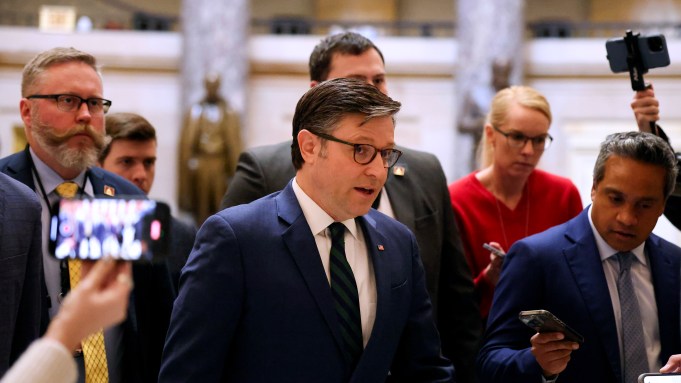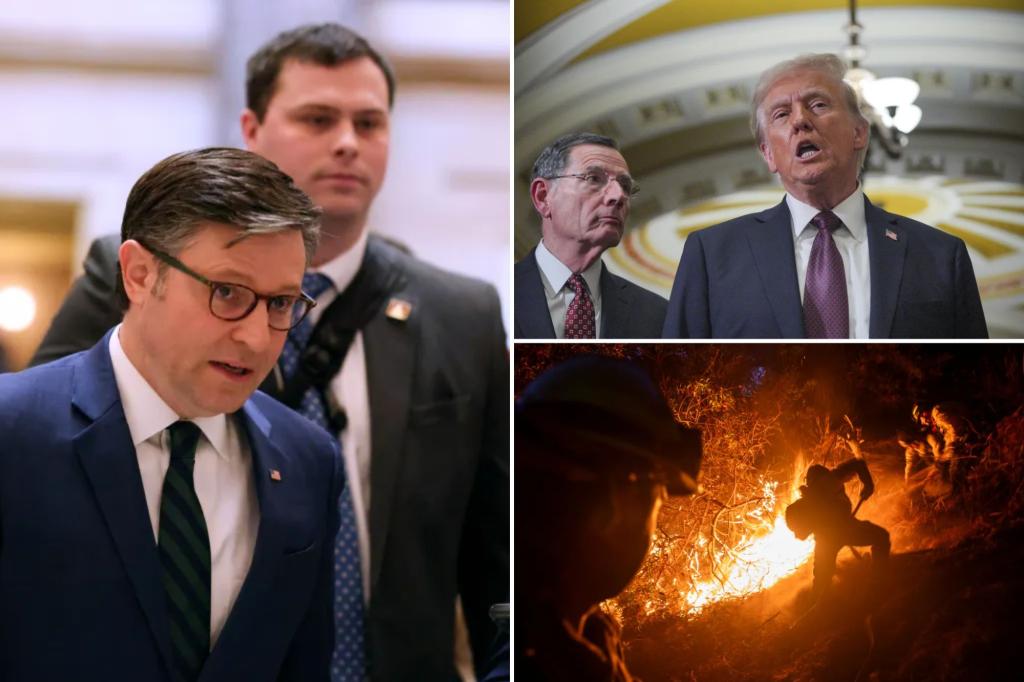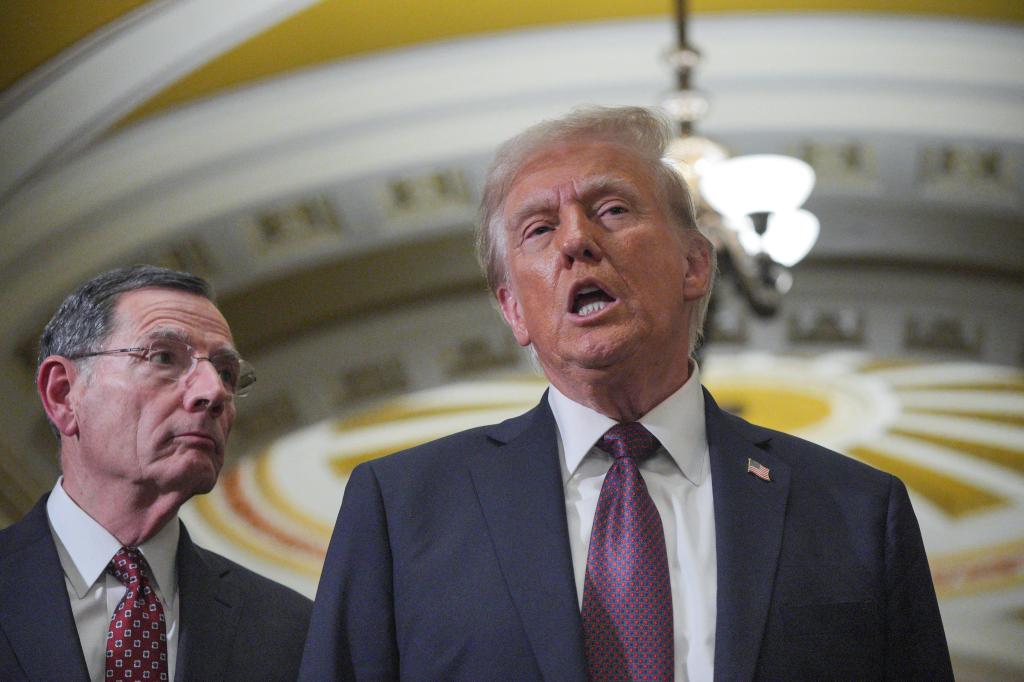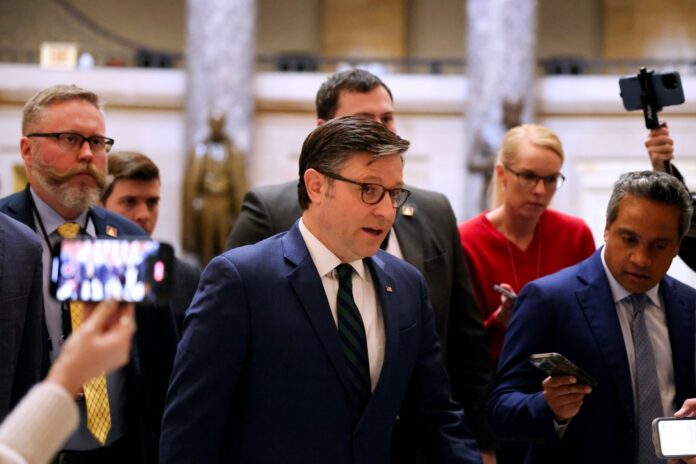As the flames of the devastating Los Angeles wildfires continue to rage, leaving a trail of destruction and heartbreak in their wake, the nation is left grappling with the enormity of the disaster. Amidst the chaos and uncertainty, a fresh debate has ignited, this time centered on the role of federal aid in the crisis. Enter Speaker Mike Johnson, who has sparked controversy with his recent remarks suggesting that “there should probably be conditions” attached to federal assistance for the affected areas. The question on everyone’s mind is: what does this mean for the thousands of people displaced, the countless lives lost, and the future of our most vulnerable communities? In this article, we’ll dive into the details, examining the implications of Johnson’s statement and what it could mean for the long-term recovery of the region.
Speaker’s Call for Conditions

House Speaker Mike Johnson (R-LA) told reporters that there “should probably be conditions” placed on additional federal aid to address the devastation from the Los Angeles wildfires. “We’ve got to have a serious conversation about that,” Johnson told CNN on Capitol Hill. “Obviously, there has been water resource mismanagement, forest management mistakes, all sorts of problems. And it does come down to leadership. And it appears to us that state and local leaders were derelict in their duty and in many respects. So that’s something that has to be factored in. I think there should probably be conditions on that aid. That’s my personal view. We’ll see what the consensus is. I haven’t had a chance to socialize that with any of the members over the weekend, because we’ve all been very busy, but it’ll be part of the discussion for sure.”

Johnson’s Comments on Federal Aid
Johnson’s comments align with longtime criticism on the right of California’s Democratic leadership. At the end of the year, Congress passed a $100 billion disaster relief package, including money to address the devastation from hurricanes Helene and Milton, which impacted the southeastern United States, including North Carolina and Florida. That package did not come with conditions that mandated that state government change policy.

Implications for California and the State’s Leadership
President-elect Donald Trump has blasted California Governor Gavin Newsom as “incompetent” for his handling of the state’s fire risk. Newsom has invited Trump to tour the devastation but has received no response. But in an interview with Meet the Press, he said that Trump has spread falsehoods about the fires. “That mis- and disinformation I don’t think advantages or aids any of us,” Newsom said. “Responding to Donald Trump’s insults, we would spend another month. I’m very familiar with them. Every elected official that he disagrees with is very familiar with them.”
Congressional Discussions and Plans
Over the weekend, some two dozen Republicans dined with President-elect Donald Trump at Mar-a-Lago and discussed the possibility of tying supplemental wildfire aid to an increase in the debt ceiling ahead of an expected June deadline to avert default, Politico reported. Johnson confirmed Monday that there has been “some discussion” about tying additional aid to a debt limit increase.
Tying Supplemental Aid to Debt Ceiling Increase
Scores of Republicans have faulted California’s all-Democratic leadership for failures ahead of the wildfires, including a cut to the Los Angeles Fire Department’s budget of $17.6 million for this current fiscal year by Mayor Karen Bass. Over the weekend, Senate Majority Whip John Barrasso (R-Wyo.) also predicted that there would be “strings attached” for any additional aid.
Senate Majority Whip John Barrasso’s Predictions and Concerns
“I expect that there will be strings attached to money that is ultimately approved, and it has to do with being ready the next time, because this was a gross failure,” Barrasso told CBS’ “Face the Nation” on Sunday. “It’s heartbreaking to hear the fire chief say that they’ve diverted all of this money away from the fire department to be used for social programs, when they were already stretched too thin,” Barrasso bemoaned. “I expect there’s going to be hearings, there’s going to be requests of Congress. There can’t be a blank check on this,” Barrasso added. “These sorts of things can’t happen again. And the policies of the liberal administration out there, I believe have made these fires worse.”
Practical Aspects and Analysis
Lawmakers may also be inclined to wait for firmer estimates of the total devastation from the wildfires. President Biden has already approved a major disaster declaration for California and vowed to provide federal grants for the beleaguered state. Meanwhile, Trump, 78, has demanded that Newsom tender his resignation as governor. Newsom, 57, has responded by first accusing Trump of politicizing the disaster before inviting the president-elect to come to California to see the devastation for himself.
Estimating Total Devastation and Federal Emergency Relief
Wildfire-ravaged California should not receive a blank check from the federal government for emergency aid, House Speaker Mike Johnson declared Monday. “I think we’ve got to have a serious conversation about that,” Johnson (R-La.) told reporters as the House returned to work following a three-day weekend. “Obviously, there has been water resource mismanagement. Forest management mistakes — all sorts of problems. And it does come down to leadership,” the speaker explained. “It appears to us that state and local leaders were derelict in their duty in many respects. So that’s something that has to be factored in. I think there should probably be conditions on that aid. That’s my personal view. I haven’t seen what the consensus is.”
Conclusion
In conclusion, Speaker Mike Johnson’s recent statements have sparked a crucial conversation about the necessity of placing conditions on federal aid for the Los Angeles wildfires. The article highlighted Johnson’s assertion that there “should probably be conditions” attached to such aid, given the devastating impact of the wildfires on the city and its residents. This stance was rooted in concerns over the potential misuse of federal funds and the need for accountability in disaster relief efforts.
The significance of Johnson’s comments lies in the fact that they underscore the complex issues surrounding disaster relief and the need for a more nuanced approach. With wildfires becoming increasingly frequent and severe, it is essential to address the root causes of these disasters and to ensure that federal aid is used effectively to support affected communities. Moreover, Johnson’s proposal highlights the importance of accountability and transparency in disaster relief efforts, which can have far-reaching implications for the way we approach emergency response and recovery.

